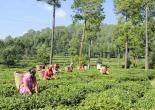- Skip to main content
- Screen Reader Access
- Skip to navigation
- Text Size
- Select Theme Default Theme Yellow Theme Pink Theme Blue Theme
- हिंदी में
External Links
Hit Counter 0001784075 Since: 01-02-2011
- Home
- Achievements
- Nursery Establishment
Nursery Establishment
Altitude has been a prime determining factor to be pondered so far as tea cultivation is concerned. Keeping in view to meet the present day demand to produce flavoury tea comparable to Darjeeling teas coupled with higher yield, a planting system was adopted comprising of flavoury clones in 60% area, flavoury biclonal seed stocks in 15% and liquoring high yielding biclonal seed stocks in the remaining 25% area of a Tea estate.
planting materials were raised by Vegetative Propagation method, i.e. by clonal cuttings of recommended clones. The clonal cuttings were brought from the Banoori Tea Experimental Farm (a part of the famous Holta Tea Estate) of the then Council of Scientific & Industrial Research Complex (now Institute of Himalayan Bioresource Technology), Palampur, Himachal Pradesh, and the well-known Makaibari Tea Estate of Darjeeling. Subsequently, propagation by seeds of the Kangra Jat was discontinued because of its low yield potential inspite of good quality.
The following plant materials have been used in all the plantations:
Highly flavoury standard Darjeeling clones
Takdah-78, Takdah-383, Ambari AV2 and Phoobsering 312
High yield clones with average flavour .
Rungli- Rungliot 17/144(Darjeeling clones) and Upasi 9 (United Planters' Association of South India, Coonoor, Tamilnadu)
High yield BSS with average flavour
TS 379 & TS 378 (Darjeeling BSS) and TS 449,TS 520,TS 462 (Assam BSS)











